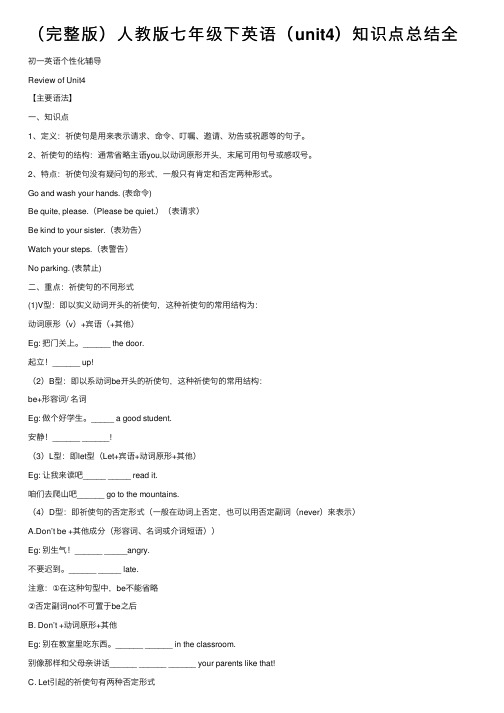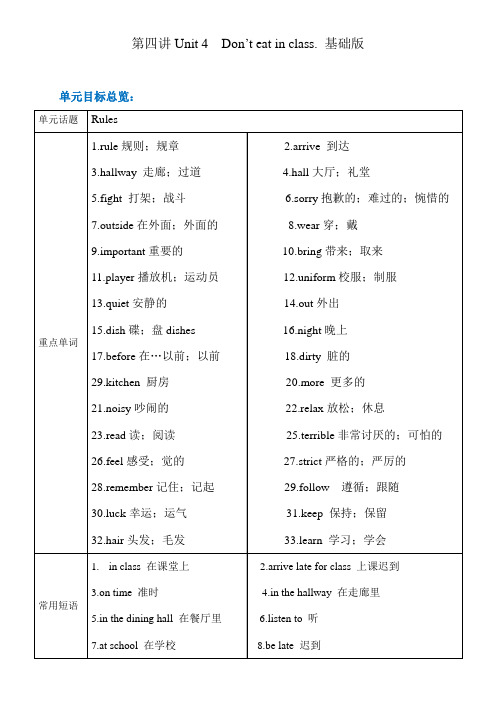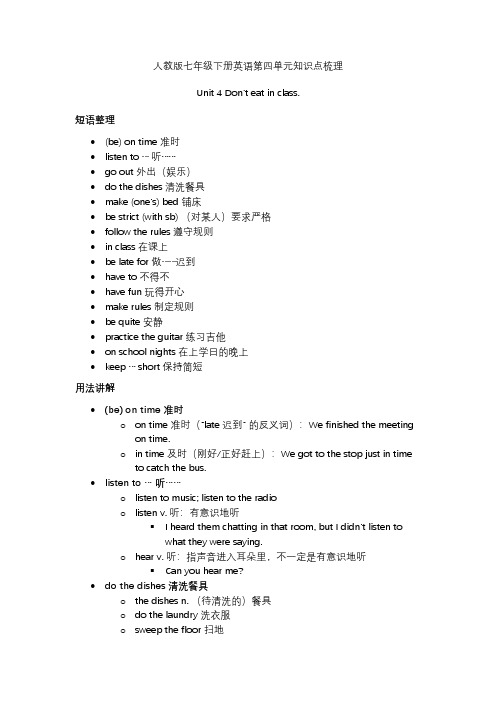人教版七年级下册英语第四单元知识点归纳
人教版七年级下册英语unit4知识点+经典练习题

人教版七年级下册英语unit4知识点+经典练习题人教版七年级下册英语unit4 知识点+经典练习题Unit4.Don’t run in the hall way!One:重点词组1.class rules班规;school rules校规;a lot of/lots of rules许多规则;make rules制定规则;follow the rules遵守规则;wear schol uniforms穿校服;wear a hat戴帽子;listen to(the music\the tape)听音乐/听磁带;watch the video/DVD/VCD.观看---;eat in the dinning hall在餐厅吃饭;fight with others与别人打架;run in the hall way在大厅过道跑步;2.arrive late for class上课迟到;be late for class上课迟到;be late for school上学迟到;be quiet安静的;be noisy吵闹的;make the /your bed整理床铺;talk aloud/loudly大声交谈;make much noise大声喧哗;relax yourself放松你自己;3. Too many/too much太多;on school nights在学校的晚上;make dinner做饭;on time准时;Have to---必须,不得不;Two:重点句型1. don’t +v! 请不要---(否定祈使句)(1)Please don’t run in the hall way!请别在大厅过道跑步!(2)Don’t fight with others,please.请不要和别人打架!(3)Don’t make much noise吵杂声at the library!别在图书馆发出吵闹声!(4)Don’t talk aloud/loudly in class!请别在课堂上大声交谈!(5)Don’t listen to music in class!请别在课堂上听音乐!(6)Don’t eat in the classroom,plea se!请别在教室吃东西!(7)Please don’t arrive late for class\school!上学/课请不要迟到!Please don’t be l ate for class/school.(8)Tom,please don’t read in bed!(9)Don’t be noisy!请不要吵闹!(10)Please be quiet!请保持安静!2.-What are the rules?/-We must be on time for class.3.-What are the school rules?有哪些校规啊?-What are the class rules?有哪些班规啊?4.What do you have to do?你一定得做什么啊?5.-Can we (eat in the clsssroom/wear a hat in class)?我们必须---吗?6.-Do you have to get to school before 8am?-Does she have to wear a uniform at school?7(1)There are lots of things to do.There are lots of things you can do.你有许多事情可以做(2)They make rules to help us,we have to follow these rules.(3)You should listen to music to relax yourself.你应当听音乐来放松一下你自己。
七年级下册英语第四单元知识点归纳总结

七年级下册英语第四单元知识点归纳总结(经典版)编制人:__________________审核人:__________________审批人:__________________编制单位:__________________编制时间:____年____月____日序言下载提示:该文档是本店铺精心编制而成的,希望大家下载后,能够帮助大家解决实际问题。
文档下载后可定制修改,请根据实际需要进行调整和使用,谢谢!并且,本店铺为大家提供各种类型的经典资料,如办公资料、职场资料、生活资料、学习资料、课堂资料、阅读资料、知识资料、党建资料、教育资料、其他资料等等,想了解不同资料格式和写法,敬请关注!Download tips: This document is carefully compiled by this editor. I hope that after you download it, it can help you solve practical problems. The document can be customized and modified after downloading, please adjust and use it according to actual needs, thank you!And, this store provides various types of classic materials for everyone, such as office materials, workplace materials, lifestyle materials, learning materials, classroom materials, reading materials, knowledge materials, party building materials, educational materials, other materials, etc. If you want to learn about different data formats and writing methods, please pay attention!七年级下册英语第四单元知识点归纳总结人教版七年级下册英语第四单元知识点归纳总结想要学好七年级英语,首先就要把课本上的英语单词和短语背好才能打好学习英语的基础。
(完整版)人教版七年级下英语(unit4)知识点总结全

(完整版)⼈教版七年级下英语(unit4)知识点总结全初⼀英语个性化辅导Review of Unit4【主要语法】⼀、知识点1、定义:祈使句是⽤来表⽰请求、命令、叮嘱、邀请、劝告或祝愿等的句⼦。
2、祈使句的结构:通常省略主语you,以动词原形开头,末尾可⽤句号或感叹号。
2、特点:祈使句没有疑问句的形式,⼀般只有肯定和否定两种形式。
Go and wash your hands. (表命令)Be quite, please.(Please be quiet.)(表请求)Be kind to your sister.(表劝告)Watch your steps.(表警告)No parking. (表禁⽌)⼆、重点:祈使句的不同形式(1)V型:即以实义动词开头的祈使句,这种祈使句的常⽤结构为:动词原形(v)+宾语(+其他)Eg: 把门关上。
______ the door.起⽴!______ up!(2)B型:即以系动词be开头的祈使句,这种祈使句的常⽤结构:be+形容词/ 名词Eg: 做个好学⽣。
_____ a good student.安静!______ ______!(3)L型:即let型(Let+宾语+动词原形+其他)Eg: 让我来读吧_____ _____ read it.咱们去爬⼭吧______ go to the mountains.(4)D型:即祈使句的否定形式(⼀般在动词上否定,也可以⽤否定副词(never)来表⽰)A.Don’t be +其他成分(形容词、名词或介词短语))Eg: 别⽣⽓!______ _____angry.不要迟到。
______ _____ late.注意:①在这种句型中,be不能省略②否定副词not不可置于be之后B. Don’t +动词原形+其他Eg: 别在教室⾥吃东西。
______ ______ in the classroom.别像那样和⽗母亲讲话______ ______ ______ your parents like that!C. Let引起的祈使句有两种否定形式a. Let+宾语+not+动词原形+其他Let her not do that.Let’s not think about it. It’s only a waste of time.b. Don’t+ let+宾语+动词原形+其他Don’t let Jim do that.Don’t let us go, please.三、难点:1、特殊形式的祈使句(1)在公共场合的提⽰语中,否定祈使句常⽤“No+名词/ V-ing形式”结构,表⽰“禁⽌做某事”。
人教版英语七年级下册Unit4Don’teatinclass.知识点及课后作业

第四讲Unit 4 Don’t eat in class. 基础版单元目标总览:【知识点详解】1、Don’t arrive late for class.上课不要迟到。
1)arrive 意为“到达”。
arrive at+小地点,arrive in +大地点。
◆I will arrive in Beijing next week. 我下周到北京。
◆I arrived at the small village on a cold morning. 在一个寒冷的早晨我到达了那个小村庄。
2)arrive 后面跟地点副词here, there, home时,不需要跟介词。
◆arrive home 到家arrive here 到这儿2、You must be on time.你必须准时。
(1)on time&in timeon time 意为“按时,准时”,指按照规定的时间或者指定的时间做某事;而in time指“及时”,指不迟到或在规定的时间之前或者接近所规定的时间做某事。
◆We must arrive there on time. 我们必须按时到达那里。
At last, the police arrived there in time. 最后警察及时赶到了那里。
(2)must情态动词,意为“必须”,不能单独做谓语,必须和动词原形以其构成谓语;其后接动词原形;其否定形式mustn’t意为“禁止,千万不要”◆I must do my homework before dinner.晚饭前我必须做完作业。
3、Don’t listen to music in class.不要再课堂上听音乐。
(1)listen 是不及物动词,意为“听,倾听”,强调听的动作,后面接宾语时要加上介词to。
◆We should listen to the teacher carefully. 我们应该认真听老师讲课。
◆Listen! Someone is singing in the garden. 听! 有人在花园里唱歌。
(完整版)人教版英语七年级下册第四单元短语语法知识点总结及练习

(完整版)人教版英语七年级下册第四单元短语语法知识点总结及练习Unit 4Don’t eat in class【短语归纳】1.on time 准时,按时2. listen to …听……3. in class 在课上4. be late for 做……迟到5. have to 不得不6. be quiet安静7. go out外出8. do the dishes 清洗餐具9. make breakfast 做早饭10. make (one’s) bed 铺床11. be noisy 吵闹12. keep one’s hair short 留短发13. play with sb. 和某人一起玩14. play the piano 弹钢琴15. have fun 玩得高兴16. make rules 制订规则【用法集萃】1.Don’t + 动词原形+其他,不要做某事。
2.help sb. (to) do sth. 帮助某人做某事3.too many + 可数名词复数太多的……4.practice doing sth. 练习做某事5. be strict with sb. 对某人要求严格6. be strict in sth. 对某事要要求严格7. leave sth sp. 把某物忘在某地8. keep + 宾语+形容词使……保持某种状态9. learn to do sth. 学会做某事10. have to do sth. 不得不做某事┃语法探究┃┃.祈使句定义:用于表达命令、请求、劝告、警告、禁止等的句子叫__________句。
时态:使用______________时态。
结构:动词原形+其他成分+please. 否定祈使句在动词原形前面加__________ 。
如:Be quiet in the classroom, please.在教室里请保持安静。
Don't fight. 不要打架┃.情态动词have to 和must1.情态动词have to和must都表示“__________”的意思。
人教版七年级下册英语第四单元知识点整理

人教版七年级下册英语第四单元知识点梳理Unit 4 Don’t eat in class.短语整理•(be) on time 准时•listen to … 听……•go out 外出(娱乐)•do the dishes 清洗餐具•make (one’s) bed 铺床•be strict (with sb) (对某人)要求严格•follow the rules 遵守规则•in class 在课上•be late for 做……迟到•have to 不得不•have fun 玩得开心•make rules 制定规则•be quite 安静•practice the guitar 练习吉他•on school nights 在上学日的晚上•keep … short 保持简短用法讲解•(be) on time 准时o on time 准时(“late 迟到” 的反义词):We finished the meeting on time.o in time 及时(刚好/正好赶上):We got to the stop just in time to catch the bus.•listen to … 听……o listen to music; listen to the radioo listen v. 听:有意识地听▪I heard them chatting in that room, but I didn’t listen towhat they were saying.o hear v. 听:指声音进入耳朵里,不一定是有意识地听▪Can you hear me?•do the dishes 清洗餐具o the dishes n. (待清洗的)餐具o do the laundry 洗衣服o sweep the floor 扫地o mop the floor 拖地o do the cooking 做饭•make (one’s) bed 铺床o Remember to make your bed!•be strict (with sb) (对某人)要求严格o The teacher is strict with us.•follow the rules 遵守规则o= obey the ruleso= observe the ruleso We must follow the rules in the school.•in class 在课上o You shouldn’t eat in class. 上课时不能吃东西。
人教版七年级英语下册第四单元知识点总结

人教版七年级英语下册第四单元知识点总结本文总结了人教版七年级英语下册第四单元的主要知识点。
1. Unit 4单词- 普通名词:动物(animals)、狗(dog)、猫(cat)、鸟(bird)、兔子(rabbit)等。
- 动词:看(look)、听(listen)、读(read)、写(write)、跳(jump)等。
- 形容词:高(tall)、矮(short)、粗(fat)、瘦(thin)等。
- 介词:在...上(on)、在...下面(under)、在...旁边(next to)等。
2. Unit 4句型- What animals do you like?(你喜欢什么动物?)- I like cats.(我喜欢猫。
)- What does Gina look like?(吉娜长得什么样?)- She is tall and thin.(她高又瘦。
)- What can rabbits do?(兔子会做什么?)- Rabbits can jump high.(兔子能跳得很高。
)3. Unit 4语法- 一般现在时:表示经常性的行为或惯。
- I like dogs.(我喜欢狗。
)- She looks like her mother.(她长得像她妈妈。
)- 持续性动词:表示持续性或正在进行的动作。
- I am reading a book.(我正在读一本书。
)- Look! The cat is sleeping.(看!那只猫在睡觉。
)4. Unit 4交际用语- 问答交流:- -- What animals do you like? -- I like dogs.(-- 你喜欢什么动物? -- 我喜欢狗。
)- -- What does Jane look like? -- She is short and fat. (-- Jane长得怎么样? -- 她又矮又胖。
)- 描述交流:- Look! It's a bird.(看!这是只鸟。
人教版英语初一下学期第四单元知识点大总结

人教版英语初一下学期第四单元知识点大总结人教版英语初一下学期第四单元主要讲述了以下几个知识点:1. 表示能力和无能力:- 表示能力:can(肯定句)、be able to(否定句和疑问句) e.g. I can swim.(我会游泳。
)She is able to play the piano.(她会弹钢琴。
)注意:在否定句和疑问句中,can要用be able to来替代。
- 表示无能力:cannot(或can’t)e.g. I cannot sing.(我不会唱歌。
)2. 表示意愿和打算:- 意愿:would like to(或want to)e.g. I would like to go shopping.(我想去购物。
)They want to watch a movie.(他们想看电影。
)- 打算:be going toe.g. I am going to visit my grandparents tomorrow.(我明天要去看望我的祖父母。
)3. 第一时间提出建议:- Shall we... ?e.g. Shall we go for a walk?(我们出去散散步好吗?)4. 英文缩写:- 单词缩写:I'm(I am)、isn't(is not)、that's(that is)等 - 月份缩写:Jan.(January)、Feb.(February)等5. 短语和句型:- in the swimming pool(在游泳池里) - go camping(去露营)- have a good time(过得愉快)- fly kites(放风筝)- take a walk(散步)- the day after tomorrow(后天)- next month(下个月)。
- 1、下载文档前请自行甄别文档内容的完整性,平台不提供额外的编辑、内容补充、找答案等附加服务。
- 2、"仅部分预览"的文档,不可在线预览部分如存在完整性等问题,可反馈申请退款(可完整预览的文档不适用该条件!)。
- 3、如文档侵犯您的权益,请联系客服反馈,我们会尽快为您处理(人工客服工作时间:9:00-18:30)。
人教版七年级下册第四单元知识点归纳Unit 4Don’t eat in class.
◆短语归纳
1. on time准时,按时
4. be late for做……迟到
5. dining hall饭厅,餐厅
6. be quiet安静
10. make (one’s) bed铺床11. be noisy吵闹12. keep one’s hair short留短发
16. make(up)rules制订规则
及时)
19.break(fallow/keep)the rules违反(遵守)规章制度
20. arrive late for class = be late for class上课迟到
21. eat in the classroom在教室里吃东西22.. wear a hat (hats)戴帽子
23.school uniforms校服24. wear uniforms穿制服
25.I see我明白了26.according to根据,依据
27.share(sth)with sb和某人分享(…)
28. on school days在上学期间29. on school nights在校期间的晚上
30. practice (playing) the piano练习弹钢琴31.see friends看望朋友
32.clean (one’s) room打扫房间33.do the dishes洗餐具
34. too many/much太多的(可数/不可数)35.learn to do sth学(做某事)
36.go to bed去睡觉(be in bed在床上)37.think about (sb/sth/doing sth)考虑(某人/某物/做某事)
38.be strict (with sb)对某人)要求严格39. . Don“t talk. = No talking.不要说话
17.school rules学校规章制度18. on time准时(in time
2. listen to听……
3. in class在课上
7. go out外出8.dothedishes清洗餐具9.Makebreakfast做早饭
13.playwithsb.和某人一起玩14.playthepiano弹钢琴15.havefun玩得高兴◆用法集萃
1. Don’t +动词原形+其他,不要做某事。
2. help sb. (to) do sth.帮助某人做某事
3. too many +可数名词复数太多的……
4. practice doing sth.练习做某事
5. be strict with sb.对某人要求严格
6. be strict in sth.对某事要要求严格
7. leave sth sp.把某物忘在某地
8. keep +宾语+形容词使……保持某种状态
9. learn to do sth.学会做某事
10. have to do sth.不得不做某事
◆典句必背
2.Canwebringmusicplayerstoschool?我们可以带音乐播放器到学校吗?
3. And we always have to wear the school uniform.并且我们总是不得不穿校服。
4. There are too many rules!有太多的规则!
5. Don’t leave the dirty dishes in the kitchen!不要把脏盘子留在厨房里!
6. I have to keep my hair short.我不得不留短发。
◆语法
1.情态动词haveto的用法,意思是“必须、不得不“,它侧重于客观上的必要和外界的权威。
(1)结构:主语+haveto+动词原形+其他(大凡现在时,主语是第三人称单数时,用hasto;句子是过去时,用hadto.)
如:Wehavetowearsneakersforgymclass.在体育课上,我们必须穿运动鞋。
Tomhastopracticetheguitareveryday.汤姆每天必须练习弹吉它。
Ihadtogetupat5:00amlastMonday.上周一,我不得不早上5点起床。
(2)否定形式:主语+don“thaveto+动词原形+其他(大凡现在时,主语是第三人称单数时,用doesn“thaveto.句子是过去时,用didn“thaveto)
如:Nickdoesn“thavetowearauniform.尼克不必穿制服。
Wedidn“thavetodoourhomeworkatonce.我们不必马上完成作业。
疑问句:Do(Does或Did)+主语+haveto+动词原形+其他如:Doyouhavetostayathomeonweekends?周末你必须呆在家里吗?Yes,Ido./No,Idon“t.是的,我必须。
不,我不必。
Didhehavetogotobedby11:00lastnight?昨晚,他不得不11点前上床睡觉吗?
2.情态动词can的用法
(1)表示能力,“会““能“(在第一册中已经学习这种用法)
Canyouplaytheguitar?你会弹吉它吗?
JudycanspeakalittleChinese.朱蒂会说一点中文。
Icandanceandsing.我能唱歌又能跳舞。
(2)表示允许、许可,“可以“、“能“(在这一课中新学的词义)Canthestudentsruninthehallways?学生们可以在走廊上跑吗?Wecaneatoutside.我们可以在外面吃东西。
CanIcomein?我能进来吗?注意同样是情态动词,can和haveto的用法是有区别的,和大部分情态动词一样,can在否定句中,直接在can后加上not,在疑问句中,把can放到主语前面,并且没有人称和数的变化。
3.b einbed“在床上、卧床“in和bed之间不能用冠词,bed也不用复数。
Heisinbedfor10years.他卧床10年了。
Davehastobeinbedearlyeverynight.大卫每晚必须很早睡觉。
4.arrivelatefor与belatefor意思相近,“迟到“Don“tarrive(be)lateforschool.上学别迟到。
Iarrived(was)
lateforthemeetingyesterday.我昨天开会迟到了。
5.Notalking!“禁止交谈!“no后面加上名词或动名词(doing)也表示不要做某事。
与don“t+do的用法相似。
Nowetumbrellas!/Don“tputwetumbrellashere!禁止放湿雨
伞!Nofood!Don“teatfoodhere!禁止吃食物!
Nosmoking!Don“tsmokehere!禁止吸烟!
6.语法(祈使句)祈使句是用来表示请求、命令、叮嘱、号召或者劝告等的句子,这类句子的主语常是第二人称you,也就是听话者,因而you常省去了。
祈使句的开头是动词原形。
如:Lookout!小心!
Waithereforme!在这等我!Besuretocomehereontime!务必准时来到这里!
祈使句的否定形式多以donot(常缩写成don“t)开头,再加上动词原形。
Don“tarrivelateforschool.上学别迟到。
Don“tfight!别打架!
Don“tlookoutofthewindow.不要向窗外看
◆话题写作
Dear Tom,
Thanks for your last letter. You want to know the rules in our school. Nowlet me tell you about them.
Wecan’tarrivelateforclass.Wecan’ttalkloudlyinclass.Weshouldkeepquiet.Whenw emeetourteachersonourway,weshouldsayhellotothem. We can’t eat or drink in class, and we can’t listen to music or play gamesin class.
I think we have too many rules. What about yours? Please write and tellme.
Yours,
Li Ming。
